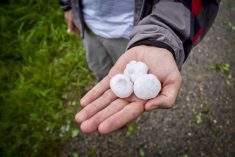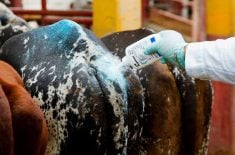With the exception of Ontario, Canadian beekeepers had a good winter in 2013-14.
Apiarists in Alberta lost 18.5 percent of their bee colonies over the winter, Saskatchewan losses were 18.9 percent and Manitoba lost 24 percent, based on data compiled by the Canadian Association of Professional Apiculturists (CAPA).
The figures are improvements over 2012-13 when 23.8 percent of bee hives in Alberta didn’t make it through the winter, Saskatchewan losses were 27 percent and Manitoba losses were 46.4 percent.
Nationally, 25 percent of bee colonies didn’t survive the winter this year, compared to 28.6 percent in 2012-13.
Read Also

American agriculture groups call for full renewal of Canada-United States-Mexico trade deal
American food and agriculture groups are calling for a full 16-year renewal of the Canada-United States-Mexico-Agreement (CUSMA).
Ontario bees did not enjoy the long winter. Approximately 58 percent of bee colonies in Ontario were dead or unproductive by the spring.
The Ontario Beekeepers’ Association blamed neonicotinoids, an insecticidal seed treatment applied to corn, soybeans and canola, for the losses.
“Ontario beekeepers have been devastated by exposure of colonies to these highly toxic pesticides,” said OBA president Dan Davidson.
“Not only do they kill bees outright, but exposure in the hive through contaminated pollen almost guarantees they will not survive the winter. Beekeepers are reporting significant summer losses, as well, as a result of pesticide contamination.”
CAPA also mentioned neonicotinoids as a factor in the Ontario losses.
“There are still many concerns amongst beekeepers regarding the potential chronic and sub-lethal impact of pesticides and agrochemicals,” the report noted. “There are concerns amongst some beekeepers, particularly in Ontario and Quebec, that exposure to neonicotinoid insecticides during the spring and summer may lead to increased stress to colonies, contributing to winter loss.”
Looking closer at the Ontario data, CAPA said a number of Ontario beekeepers lost nine to 22 percent of their colonies over the winter, and further study is needed to understand this variation.
CAPA said Canadian beekeepers are making progress on winter losses. The industry has improved its monitoring of disease and pathogens, enhanced varroa mite control and promoted best management practices.
CAPA data shows that winter losses in Canada were 30 to 35 percent in the late 2000s. Since 2010, winter losses have ranged from 15 to 28 percent.















